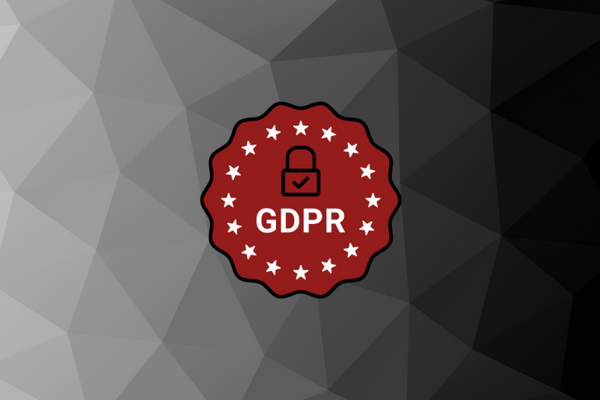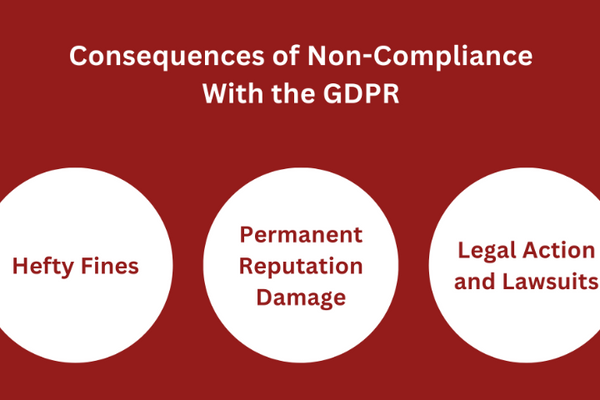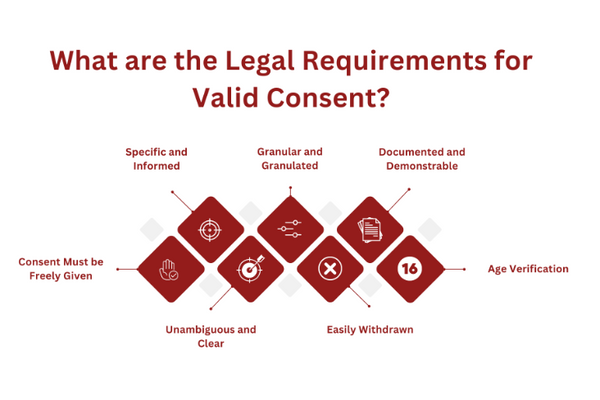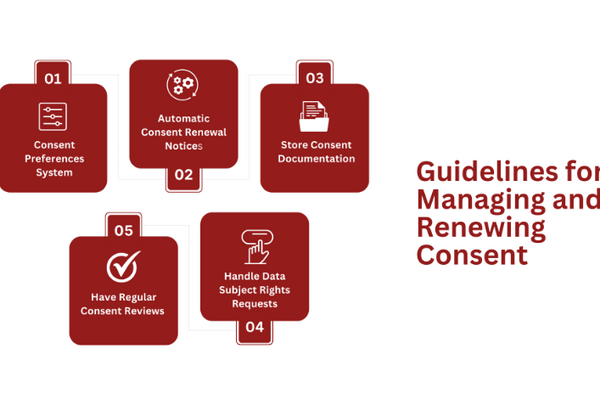
In today’s digital landscape, businesses must prioritize General Data Protection Regulation (GDPR) consent management to uphold data subject rights. Effective GDPR consent management ensures that businesses obtain valid consent from consumers before collecting or processing their data.
Consent management in the GDPR involves implementing transparent processes that empower individuals to exercise their rights, such as the right to access, rectify, and erase their personal data.
By embracing robust consent management practices, businesses can not only meet regulatory compliance but also build trust and strengthen relationships with their consumers.
In this article, you will learn consent management and actionable steps toward compliance:
What is the General Data Protection Regulation?
What is the General Data Protection Regulation.png

The GDPR is a comprehensive data protection law that was enacted by the European Union (EU) to safeguard the privacy and personal information of individuals. Its purpose is to establish a unified and robust framework for data protection across all EU member states.
Under the GDPR, subject rights include the right to know how data is being collected, used, and processed. Consumers have the right to access their data, rectify inaccuracies, and even request the deletion of their information.
While the GDPR deals with the data of citizens of EU countries, it also enforces the safe data handling of EU consumers in non-EU countries as well. This means that if your business is located in the USA, but you handle consumer data from EU citizens, you must ensure GDPR compliance.
Consequences of Non-Compliance With the GDPR
Consequences of Non-Compliance With the GDPR.png

The GDPR has established a robust enforcement framework, granting supervisory authorities the power to impose substantial penalties for non-compliance. The entity responsible for enforcing these rules is the European Data Protection Board.
Non-compliance with GDPR consent requirements can have severe consequences for businesses, including regulatory fines and reputational damage.
Here are some of the consequences for businesses that go against the GDPR guidelines:
Hefty Fines for Non-Compliant Businesses
The primary risk of non-compliance is the potential for substantial regulatory fines. The GDPR empowers supervisory authorities to levy fines of up to €20 million or 4% of the organization’s global annual turnover (whichever is higher). These fines are proportionate to the gravity of the violation and can pose a considerable financial burden on businesses.
Permanent Reputation Damage
Another critical risk is reputational damage. Organizations that neglect to prioritize data privacy and consent management may face public backlash and loss of consumer trust. In an era of heightened data protection awareness, consumers are increasingly concerned about how their personal information is handled.
Legal Action and Lawsuits
Non-compliance can also trigger lawsuits by the affected consumers and investigations and audits by supervisory authorities. These can divert resources from core business operations and disrupt normal workflows.
Organizations may undergo meticulous assessments of their data processing activities, policies, and procedures, incurring additional costs and administrative burdens.
To ensure compliance, businesses must implement transparent and robust consent processes. Captain Compliance is here to help if you need help with GDPR consent management.
You can contact us to discuss how your business can avoid non-compliance penalties.
How to Request Consent Under the GDPR?
Consent holds a significant role as one of the lawful bases for processing personal data under the GDPR. It upholds the principle of individual autonomy and grants consumers control over the usage of personal information. Consent should be obtained before commencing data processing and can be withdrawn at any time, giving individuals ongoing control over their data.
Consent differs from other lawful bases in requiring individuals to actively and explicitly provide their agreement for their data to be processed. It places the power in the hands of individuals, enabling them to decide whether or not to grant permission.
It’s crucial to note that the GDPR sets high standards for valid consent. It mandates that consent must be freely given, specific, informed, unambiguous, and easily withdrawable.
What are the Legal Requirements for Valid Consent?
What are the Legal Requirements for Valid Consent.png

Obtaining valid consent under the GDPR involves adhering to specific requirements that businesses must meet to ensure compliance. However, please note that consent is just one pillar of proper GDPR compliance solutions your business should implement.
The following list outlines the key requirements for valid consent:
Consent Must be Freely Given
Consent must be given voluntarily, without coercion or negative consequences for individuals who choose not to provide consent. The wording used to convey why consent is to be given must be straightforward.
Specific and Informed
Consent must be specific to each purpose of data processing, clearly stating how the data will be used. Organizations should provide individuals with detailed information regarding the processing activities, including the types of data collected, the purposes, the data recipients, and any potential transfers outside the EU/EEA.
Unambiguous and Clear
Consent must be obtained through clear and affirmative action, leaving no room for ambiguity. Pre-ticked boxes or implied consent are generally considered invalid. Individuals should actively and explicitly indicate their agreement, such as by checking an unticked box or clicking a consent button.
Granular and Granulated
Organizations should provide individuals with granular choices regarding the different processing activities. This means offering separate options for each distinct purpose of data processing and allowing individuals to choose the specific purposes they consent to.
Easily Withdrawn
Individuals have the right to withdraw their consent at any time. Organizations should provide easy and accessible mechanisms for individuals to withdraw their consent, and it should be as simple to withdraw as it was to give consent initially.
Documented and Demonstrable
Organizations must be able to demonstrate that valid consent has been obtained. This includes keeping records of when and how consent was obtained, what information was provided to individuals, and any changes made to the consent status.
Age Verification
If the processing involves offering online services to children under the age of 16 (or a lower age if permitted by member state law), businesses need to obtain consent from a parent or guardian.
By adhering to these requirements, businesses can ensure that the consent they obtain is valid, transparent, and in line with the principles of the GDPR.
We at Captain Compliance specialize in helping businesses implement these requirements. Contact us to learn more about getting your businesses a correct GDPR consent management system.
Checklist for Consent Management Best Practices
Effective consent management is crucial for businesses to demonstrate compliance with the GDPR and uphold individuals’ data protection rights. By implementing the following best practices, businesses can establish robust consent management processes:
1. Have Clear and Transparent Communication
Clearly communicate to individuals the purpose, scope, and consequences of data processing activities in plain language. Provide comprehensive information about data handling practices, including data retention periods, third-party involvement, and any international data transfers.
2. Implement Granular Consent Options
Offer granular consent options that allow individuals to choose the specific types of processing they consent to. Provide separate consent choices for different purposes and allow individuals to easily manage their consent preferences.
3. Give Consumers Opt-in Mechanisms
Use clear opt-in mechanisms to obtain consent, such as unticked boxes or affirmative actions. Avoid pre-ticked boxes or assumed consent. Ensure that consent is obtained before processing personal data and clearly link the consent request to the associated processing activity.
4. Have Option for Easy Withdrawal of Consent:
Enable individuals to easily withdraw their consent at any time. Provide clear instructions and accessible mechanisms for individuals to revoke their consent and ensure that the withdrawal process is as simple as giving consent.
5. Implement and Keep Consent Documentation
Maintain proper documentation of consent, including records of when and how consent was obtained, what information was provided to individuals, and any subsequent changes to consent status. This documentation will serve as evidence of compliance in case of audits or investigations.
6. Schedule Regular Consent Reviews
Conduct regular reviews to ensure that consent remains valid and up-to-date. Promptly review and update consent as necessary, considering changes in processing activities or regulatory requirements.
7. Data Subject Rights Enablement
Enable individuals to exercise their data subject rights easily, including the right to access, rectify, and delete personal data. Your business should implement processes and mechanisms to handle data subject requests promptly and efficiently.
By implementing these best practices, businesses can effectively manage and document consent, demonstrating their commitment to data privacy, regulatory compliance, and respect for individuals’ rights under the GDPR. Learn more about the best practices and compliance solutions your business can take.
Quick Overview of Requirements for Obtaining Consent
Clear and transparent consent requests help individuals make informed decisions about using their personal data. It involves providing comprehensive information, stating the purpose of data processing, and offering granular options for individuals to choose from.
Here are some general guidelines to help your business establish consent:
Provide Clear Information
Use Plain Language
Granular Consent Options
Avoid bundled consent
Provide Opt-in Mechanisms
Ensure Freely Given Consent
This approach empowers individuals to make informed decisions about their personal data and promotes trust between businesses and consumers. It also helps businesses meet their obligations under the GDPR by establishing a valid lawful basis for processing personal data.
Guidelines for Managing and Renewing Consent
Guidelines for Managing and Renewing Consent.png

Managing and renewing consent is a crucial aspect of effective data processing under the GDPR. It involves ongoing communication with individuals, giving them control over their consent preferences and ensuring that consent remains valid and up-to-date throughout the data processing lifecycle.
This proactive approach not only demonstrates compliance but also benefits businesses in the long run by fostering trust and maintaining positive relationships with individuals.
Create a Consent Preferences Management System
Provide individuals with user-friendly options to manage their consent preferences. This includes offering accessible and intuitive interfaces for individuals to review, update, or withdraw their consent at any time.
Setup Automatic Consent Renewal Notices
Regularly communicate with individuals to remind them of their consent and provide opportunities to renew or update their preferences. Send clear and concise notices, ensuring individuals are aware of their rights and have the option to review and make changes.
Store and Safeguard All Consent Documentation
Maintain proper documentation of consent, including records of when and how consent was obtained, the information provided to individuals, and any subsequent changes or updates to consent preferences. This documentation serves as evidence of compliance in case of audits or investigations.
Create Processes to Handle Data Subject Rights Requests
Enable individuals to exercise their data subject rights easily, such as the right to access, rectify, or delete personal data. Implement processes and mechanisms to handle data subject requests promptly and efficiently, ensuring individuals have control over their personal information.
Have Regular Consent Reviews
Conduct periodic reviews to ensure that consent remains valid and aligned with the evolving needs and expectations of individuals and regulatory requirements. Promptly review and update consent as necessary, considering changes in processing activities or regulatory guidance.
In the long run, this approach can increase consumer satisfaction, stronger data protection compliance, and a positive brand reputation, benefiting businesses by fostering loyalty and trust in an increasingly privacy-conscious landscape.
How To Manage Consent and Handle Children’s Data
Obtaining consent for the processing of children’s personal data requires additional considerations and safeguards under the GDPR. The regulation recognizes the need for enhanced protection for children and imposes specific requirements to ensure their privacy and data protection rights are upheld.
Key considerations and requirements for obtaining consent for children’s personal data processing include:
Be Aware of the Age Limit
The GDPR establishes that individuals under the age of 16 cannot provide valid consent themselves. However, member states can lower this age limit to a minimum of 13 years old. Organizations must comply with the age limit set by the respective member state where the child resides. These laws might vary depending on your location.
Have a System to Get Parental Consent
When processing the personal data of children below the applicable age limit, businesses must obtain valid consent from a parent or legal guardian. This places the organization’s responsibility to verify the child’s age and obtain the necessary consent from the appropriate parent or guardian.
Use Clear and Child-Friendly Language
Consent requests directed at children must be presented in clear and plain language that is easily understandable to the child. The language used should be age-appropriate, avoiding complex terms and concepts that may confuse or mislead the child.
Implement Multiple Additional Safeguards
Organizations must take appropriate measures to ensure that consent is genuinely given by the child. This may involve implementing age verification mechanisms or using technological solutions to verify the child’s age and obtain parental consent.
Issue Appropriate Privacy Notices
Privacy notices must be clear, concise, and written so children can easily understand. They should explain the processing of personal data, the purpose and legal basis for processing, and any rights the child and parent/guardian have regarding the data.
Understand Parental Control and Revocation Rights
Parents or guardians should be provided with the means to exercise control over their child’s personal data and be able to revoke consent at any time. Organizations must implement processes that allow parents/guardians to easily withdraw consent and manage their child’s data preferences.
By adhering to these requirements, businesses can ensure that the processing of children’s personal data is done with proper consent and respects the privacy and rights of both children and their parents or guardians.
It is essential to prioritize protecting children’s data, as they may be more vulnerable to risks associated with online activities and using their personal information.
How to Handle Consent with Third-Party Data Sharing Involved?
Informing individuals about third-party sharing is essential as it enables them to understand how their data will be used beyond the business they initially shared it with. Businesses should clearly communicate the identities of the involved third parties, the purpose of sharing, and any potential implications or risks associated with the sharing.
Obtaining separate consent for third-party sharing is particularly crucial when the sharing goes beyond what individuals reasonably expect or involves sensitive or special categories of personal data. In such cases, businesses must seek explicit consent from individuals for the specific third-party sharing activity, ensuring it is a distinct and granular consent option.
Organizations should also ensure that the third parties receiving the shared data comply with data protection regulations. Contracts or legal agreements should be in place to safeguard the shared data and ensure its processing aligns with the GDPR’s principles.
Learn more about proper data handling, including data mapping for properly handling consumers’ information.
Technology Solutions for Consent Management
Consent management software offers numerous benefits to businesses by streamlining and automating the process of obtaining, managing, and documenting consent.
These solutions provide essential features that facilitate compliance with the GDPR and enhance the overall consent management process. Here is a quick overview of the pros of utilizing consent management software:
Benefits of Consent Management Software:
Efficiency and Accuracy: Consent management software eliminates manual processes, reducing human errors and ensuring accurate record-keeping.
Transparency and Compliance: Such software enables businesses to maintain transparency by providing individuals with clear and easily understandable consent requests.
Consent Preference Management: Consent management solutions offer mechanisms for individuals to manage their consent preferences easily.
Documentation and Audit Trail: Consent management software provides a centralized platform to document and store consent records.
Integration and Customization: These solutions can integrate with existing systems and workflows, allowing businesses to seamlessly incorporate consent management into their processes.
Data Subject Rights Enablement: Consent management solutions often include functionalities to handle data subject rights requests efficiently.
Key Features to Consider When Selecting a Consent Management Solution
Consent Request Customization: The solution should allow businesses to customize consent requests to align with their specific needs and branding.
Granular Consent Options: The software should provide granular consent options, allowing individuals to selectively choose the processing activities they consent to.
Consent Preference Management: The solution should offer user-friendly interfaces for individuals to manage and update their consent preferences easily.
Documentation and Reporting: The software should provide robust documentation features to record consent details, facilitate auditing, and generate compliance reports.
Data Subject Rights Management: The solution should include functionalities to handle data subject rights requests promptly and effectively.
Integration and Scalability: Consider a solution that can integrate with existing systems and scale as the organization’s consent management needs to grow.
Captain Complianceoffers a comprehensive consent management solution that encompasses these key features to help businesses effectively manage consent in alignment with the GDPR.
Closing
Understanding and effectively managing GDPR consent is essential for businesses to comply with data protection regulations. By implementing best practices and utilizing data compliance solutions, businesses can streamline their consent processes, ensure transparency, and maintain compliance with the GDPR’s requirements.
For readers of this post, the next step would be to evaluate their current consent management practices and assess if they align with the guidelines discussed. Businesses should review their consent mechanisms, documentation processes, and data subject rights enablement to ensure they align with the GDPR’s principles.
If you need help establishing GDPR consent management for your business, we at Captain Compliance have you covered. Get in touch with us for help getting compliance solutions to ensure your business operates within a legal framework.
FAQs
Does the GDPR Apply outside the European Union?
Yes, the primary purpose of the GDPR is to ensure that data belonging to EU consumers is safeguarded, regardless of where it is used. For this reason, it is paramount for any business operating outside the EU that deals with EU consumer data to be aware of its effects and rules.
Read more on the current GDPR regulations.
How to Respond To Subjects Requesting Their Data?
When responding to subjects requesting their data, promptly acknowledge receipt of the request, verify their identity, and gather the relevant personal data. Review for any exemptions, format the data in a commonly used, machine-readable format, and provide a clear explanation of the data processing activities.
Find out more detailed steps to handle subject access requests.
Can I Get Fined For Not Complying With Cookie Consent?
Yes, there can be penalties for not complying with cookie consent requirements. Depending on the jurisdiction, regulators may impose fines for violations of data protection and privacy regulations, such as the GDPR.
Learn about the penalties for not complying with Cookie consent.